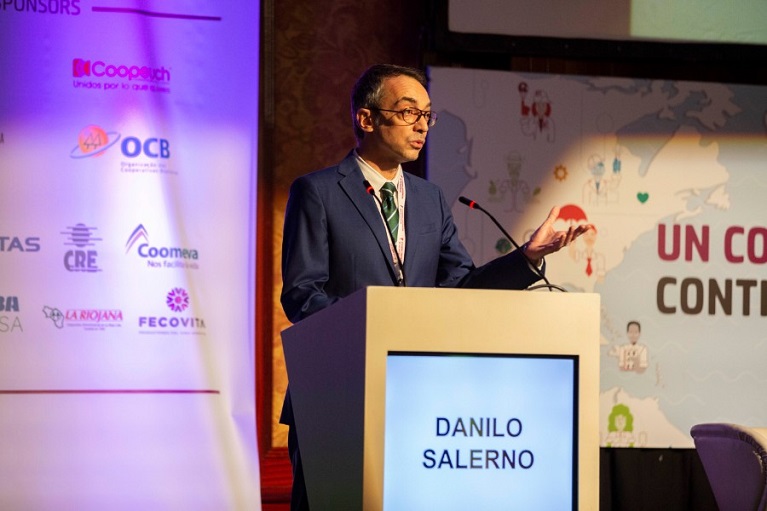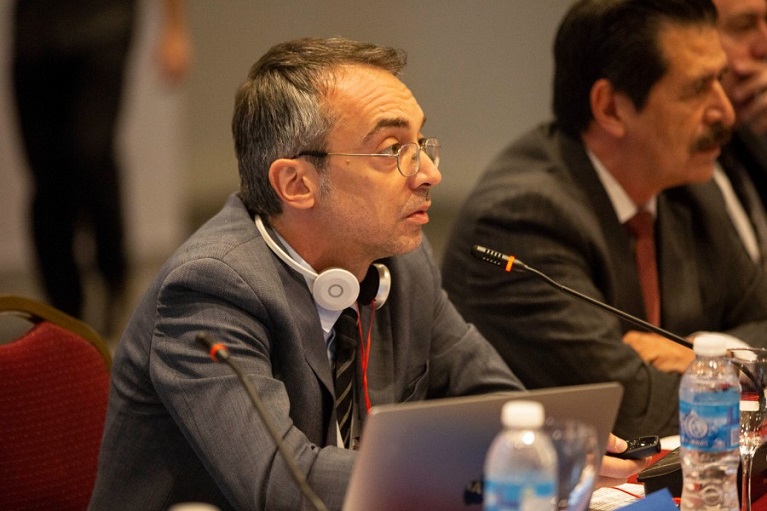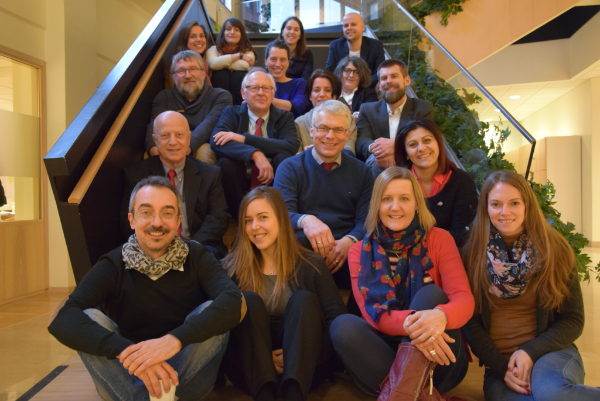ILO COOP 100 Interview
ILO COOP 100 Interview with Danilo Salerno, The Regional Director for ICA Americas
Established in March 1920, the ILO’s Cooperatives Unit marks its Centenary in 2020. On this occasion, the ILO COOP 100 Interview series features past and present ILO colleagues and key partners who were closely engaged in the ILO's work on cooperatives and the wider social and solidarity economy (SSE). The interviews reflect on their experience and contributions in the past and shares their thoughts on the future of cooperatives and the SSE in a changing world of work.
Could you tell us about your background? How did you get started working with cooperatives?
My educational background includes two Masters of Arts degrees in International Relations and Funding, a High Formation Diploma in Latin American Studies and a Bachelor Degree in Political Science.
Incidentally, my commitment to cooperatives begun from my time working with the Fairtrade movement. At the end of the 1990s I volunteered in one of the hundreds of Fairtrade world shops in Italy, specifically Mandacarù in Trento. The name derives from a Mexican cactus, able to resist the scorching temperatures of the desert with just a little reserve of water - which is a great symbol of strength and resilience. My main responsibility was to work in the warehouse unpacking all the goods coming from the Global South.
There, the experience of pricing and displaying goods on the shelves for sale made me aware of the fact that most of the producers, nowadays I would prefer to call them partners, were members of cooperatives, a business organization model which allows members to take decisions in a democratic and participatory way, to receive a fair price for their goods, to hold the property of their business, to have an impact in terms of local development, to protect the environment and to raise their voices against any form of exploitation. I started becoming curious about visiting those producers/partners in the Global South, in person, in order to ascertain with my own eyes if that was working in an effective way. My interest in international cooperative development started forming then.
I think what attracted my attention was the passion, motivation and engagement of the people I met: the volunteers of the world shops, the customers, the founders as well the Ambassadors of the Fairtrade movement. I was particularly impressed by two of them. The first was Rigoberta Menchu Tum, whom I personally met a couple of years later, when I was in charge of a European awareness raising campaign on Fairtrade. At that time Rigoberta Menchu Tum came to Italy to sign a declaration of the importance of the world shops in giving a voice to indigenous minorities at the global level. The second was a gentleman from Brazil who used to spend the summer volunteering at the national warehouse of Altromercato (the consortium we were part of) in Verona, Italy in order to understand how Italy was organized and why this model was working so well. I discovered many years later, when that gentleman became President of Brazil under the popular name of Lula, how important for his policies those summers spent in Italy had been, building partnerships and experiencing the importance of local driven policies and programs for Fairtrade and wider social and solidarity economy, including cooperatives.
You worked with Coopermondo, an Italian NGO which implemented international cooperation projects. Could you tell us about your work in Coopermondo?
The years at Coopermondo were very invigorating and encompassed the discussion both at European and international organizational levels about the role of cooperatives within international cooperation for development.
My personal contribution has been that in the 10 years as Director at Coopermondo I devised, piloted and managed cooperative development projects in Sierra Leone, Togo, Colombia, Cameroon and Mozambique. But, above all, I participated, via ad-hoc working groups, to the extension of the Italian law on international development cooperation (2014), the drafting of the EU Council conclusion 'A stronger role of the private sector in achieving inclusive and sustainable growth in developing countries' (2014) and of the 'Milan charter for Expo 2015' (2015): all of these documents recognize the role of cooperatives in the implementation of the UN 2030 Agenda.
You were also engaged in international development work of NGOs supported by national cooperative movements in Europe. What was the nature of this work?
Yes, indeed. The years at Coopermondo also meant that I played a role in setting up the network of European cooperative organizations actively engaged in international development, which has been key both for the advocacy work mentioned above and for the EU-funded Program “coops4dev” that the International Cooperative Alliance has been implementing over the past four years.The idea of that network, which later became known as Cooperatives Europe Development Platform (CEDP) where all the members are cooperative organizations members of Cooperatives Europe, started in 2008. It got moving thanks to the engagement of a small group of great cooperators such as Linda Shaw and Sarah Alldred from the Cooperative College UK, Claudia Marcus and Andreas Kappes from DGRV, and Elsa Brander from Kooperationen.

What are the priorities of Cooperatives of the Americas region with regard to the challenges facing the world today from climate crisis to forced displacement of people and pandemics?
The Americas region is afflicted by the broadest and deepest inequalities in the world. The UN Economic Commission for Latin America and the Caribbean (ECLAC) is playing a crucial role in facing this issue and advising the national governments of the region in setting up economic and social policies to fill the gaps at every level. Another key actor in the region is the Organization of the American States, founded in 1948 to provide “Democracy for peace, security and development” amongst its 35 member States.With these organizations and the regional offices of UN Agencies such as FAO and ILO, Cooperatives of the Americas has set up a strong partnership and a permanent strategic dialogue in order to contribute to the mitigation of inequalities, climate crisis and migration flows towards the Northern countries as well as the creation of decent jobs.
Both the 2019 Regional Conference of Cooperatives of the Americas and our recently approved new Strategic Plan 2020-2023 put at the centre of our agenda those priorities and we are strongly engaged in setting up concrete programs and projects with our intergovernmental organization partners.
As regards the pandemic, we organized the Regional Office in “remote work” modality, ensuring the operation of all functional areas, carried out a country by country mapping of our members’ response to COVID-19, disseminating and giving visibility to the innovation, wealth and social value produced locally through personalized infographics and a special edition of the Newsletter. We also supported our sectoral organizations, CICOPA Americas and Redacoop-Agriculture and Housing and thematic Committees in the release of political declarations of concern and boosted an information and training service centre for our members.
The most important response was an open letter to the Heads of State and the Ministers of Labour of the 23 countries where we have active members, expressing our concern about the risk of an intensification of the inequalities in the region and claiming to set up a permanent dialogue for the definition of a new economic model and policies for sustainable production and consumption for a post COVID-19 recovery.
As regards mitigating migration flows, we are working with the OAS to set up pilot projects for job creation in Central America and in the US focusing on credit access and remittances of the Latino community towards their respective countries of origin.
Additionally, the Regional Office has recently started a three-years grant funded by the EU Delegation in Costa Rica to improve migrant workers conditions during the coffee picking season and to ensure access to social services such as education, health and housing for workers and their families. But we also know that our members are engaged in several projects across different countries of the region.
On the subject of climate crisis, cooperatives are pioneers in the fight against climate change. This year, with the International Day of Cooperatives dedicated to SDG13, we had the opportunity to showcase good practices in the sustainable/green energy sector, as well as social cooperatives producing in a sustainable way or large cooperative organizations such as CRE from Bolivia or La Cruz Azul from Mexico allocating an internal department for prompt response to natural disasters.
To me climate crisis mostly means nutrition and that’s why we have strengthened our cooperation with the FAO Regional Office as well the IICA, the agriculture branch of the OAS, in an effort to improve our agriculture cooperatives' capacities to produce healthy food and help producers access markets, both directly or via public procurement joint ventures, also taking advance of the use of ICTs in agriculture.
What do you think is the role of cooperatives in contributing toward advancing the SDGs? Which SDGs are of priority in your work?
As I already mentioned, SDGs have a crucial role in the agenda of Cooperatives of the Americas: our 2020-2023 Strategic Plan has a dedicated work stream for the SDGs. During the discussions alongside the definition of the Strategic Plan, the Regional Board decided to have a holistic approach to SDGs adopting a cross-sectorial approach, where all SDGs are considered a unique body with a differentiated approach depending on sector and country.In this sense, if I have to express one priority, I would say SDG17 is the one which best reflects the approach of Cooperatives of the Americas, as advocacy towards multilateral organizations as well as partnerships with governments and other civil society actors for an enabling environment are key for the Board.